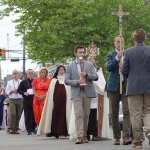BATSTO VILLAGE –– On Feb. 11 by a vote of 5-4, the NJ Marine Fisheries Council has rejected the NJ Department of Environmental Protection’s proposed moratorium on the harvest of horseshoe crabs, which several environmental groups claim is setting the Red Knot on a path to extinction.
Red Knots, a robin-sized shorebird, come to the Delaware Bay each spring after flying non-stop from Brazil. Knots rely on a superabundance of excess horseshoe crab eggs to nearly double their body weight in less than 2 weeks, before flying non-stop to their breeding grounds in the Arctic, according to a press release from several conservation groups.
Emile DeVito, of the New Jersey Conservation Foundation, stated, “The female crabs have not increased, the eggs are still dropping in number, and every crab, male or female, is still essential.”
Due to the reckless overharvest of horseshoe crabs and a subsequent rapid decline of their eggs, the Red Knot population has plummeted from over 100,000 to only 13,000 currently wintering in Tierra del Fuego, at the southern tip of South America, the report stated.
According to over 40 scientists on 4 continents, the Red Knots are facing imminent risk of extinction.
Fred Virrazzi, National Biodiversity Park, warns, “Three other shorebirds, the Ruddy Turnstone, Semipalmated Sandpiper, and Sanderling are facing serious declines due to the same lack of eggs for feeding.”
The Delaware Bay is home to largest remaining horseshoe crab population in the world. Eric Stiles, New Jersey Audubon Society, observes, “The phenomenon of the Red Knot dependence on horseshoe crab eggs has survived hundreds of thousands of years and ice ages, but cannot survive the action of the NJ Marine Fisheries Council.”
The Delaware Riverkeeper Maya van Rossum testified that “had the states of New Jersey and Delaware taken the action of a moratorium 10 years ago when the science already identified it as needed, the crabs would have already been protected at levels necessary to protect the Red Knot from extinction.” According to van Rossum, “the Council has had multiple opportunities to protect the birds and the crabs but didn’t – today is no surprise to those of us that have working on this issue all these years.”
Tim Dillingham, of the American Littoral Society, called into question the appropriateness of the Council’s action, “The Council disregarded the science, and fell back on the worst of politics. They threw the public interest under the bus in order to protect the profits of a few. They have a legal obligation to protect all the natural resources of the state, and they failed that obligation today.”








